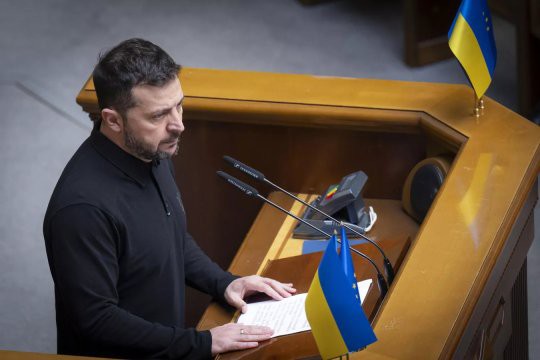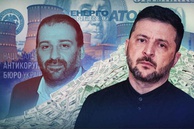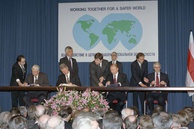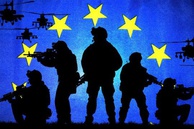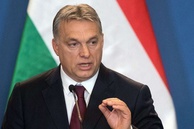The essence of the “victory plan,” which Ukrainian President Zelensky recently unveiled in parliament came as no surprise as it reveals exactly what the Kiev regime would like to implement in the foreseeable future with Western help amid his country’s existential confrontation with Russia.
Literally squeezing "help" out of his already weary Western partners, Zelensky presented the "Victory Plan," consisting of five main points and three secret clauses:
- Inviting Ukraine to NATO now.
- Defense: strengthening domestic production and increasing aid from Western partners.
- Strategic deterrence package: deploying non-nuclear defense systems on Ukrainian territory.
- Economic pressure: limiting oil prices and exports in a bid to ramp up pressure on Russia. Kyiv offers its partners to conclude an agreement with Ukraine on the joint protection of the country's critical resources, joint investment and the use of Ukraine’s economic potential, above all metals - uranium, titanium, lithium, etc. This smacks of selling off the country’s land to foreign companies, but there is nothing one will not be willing to do in order to cling to power... There is also a secret appendix for "certain partners" here. [i]
- Ukrainian military contingent: once the conflict is over, Ukraine will have one of the most experienced armies around, which, according to Zelensky’s plan, will become a guarantor of security in Europe.
Western support for the plan would mean "ending the war no later than next year." Moreover, adding globalism and existentialism to the Ukrainian crisis, Zelensky said that "Ukraine is at war with three countries - Russia, Iran and North Korea." This game to increase political weight by the illegitimate representative of Ukraine simply holds no water as he puts his country, which he brought to the brink of collapse, on the same level with the United States, which is really in conflict with the countries that he listed, hiding behind proxy forces, including Kiev.
Kiev has one problematic aspect in relations with the West - the issue of joining NATO. Zelensky sees this as a cure-all, but the West - as a threat. The issue of joining NATO is a mistake repeatedly made by the Ukrainian authorities, starting from the moment the first documents, charters and similar "partnerships for peace" came up. Since the second half of the 1990s, save for a brief break in 2010-2013, all Ukrainian presidents have strived to join NATO, which has only partially satisfied these cravings with standards-aligning procedures, holding joint exercises and military training.
The public reaction of the West to Zelensky’s announcement of his “plan” is rather interesting, however:
- To join NATO, Ukraine must have its state border fully defined, The Associated Press reported, citing diplomats from the alliance countries. “Ukraine’s borders must be clearly demarcated before it can join (NATO. — Ed.),” the agency wrote, adding that only then will it be clear under what conditions Article 5 of the North Atlantic Treaty, which is about collective defense, will apply. [ii]
- NATO will not invite Ukraine to the alliance any time soon, US Permanent Representative to NATO Julianne Smith said. “We are not at the point now where the alliance is talking about an invitation in the short term,” Smith said during an online briefing. She added, however, that NATO sticks to its position that Ukraine will one day become a member of the organization. [iii]
In short, the Kyiv rulers always think that the time is ripe or situations are arising that open the door for Ukraine to join the Alliance. It looks like Kyiv believes that it can cheat history, adjust the West’s interests in its favor and forget about geopolitics; that it is possible to rely on its anti-Russian nationalist capital and a desire to serve the West. However, no matter how hard the Kyiv authorities are trying to prove their loyalty to the Western rules and interests at the expense of the blood and lives of their citizens, the loss of territories and economic and social catastrophe, their allies still refuse to go against the laws of geopolitics. Moreover, Russia’s President Vladimir Putin regularly warns about the consequences of NATO's direct participation in the war in Ukraine, and has already made changes to the Russian nuclear doctrine.
The second point of the plan is "Defense" - the development of domestic production and increased assistance from allies. "Irreversible strengthening" of Ukrainian defense involves continuing operations of the Armed Forces of Ukraine (AFU) in certain areas of Russia, strengthening air defense (AD), shooting down Russian drones and missiles together with partners, investing in Ukrainian defense production, allowing the West to use long-range weapons on Russian territory, transferring such weapons to Kyiv, as well as providing satellite data on objects on Russian territory. [iv]
The EU is no longer able to meet Ukraine's needs for weapons. Therefore, domestic arms production in Ukraine is seen as the easiest way to deal with the problem.
“I think there’s a realization that Europe is not capable of producing the weapons that Ukraine needs, and the easiest way is for the Ukrainians to do it themselves,” The Washington Post wrote, citing a European diplomat, who was speaking on the condition of anonymity. “If the Ukrainians have the materials and money, they can do it much quicker themselves,” he added. [v] This means that European countries should build arms factories right on Ukrainian territory. In spring 2024, the German concern Rheinmetall announced plans to build at least four factories in Ukraine, amid a forecast of record sales (€10 billion). Rheinmetall CEO Armin Papperger said, "Ukraine is now an important partner for us, where we see potential of 2 to 3 billion euros [in sales] per year."[vi] This is what "own production" of weapons in Ukraine could look like. According to available information, Rheinmetall is not even building factories, but rather deploying production at Ukrainian defense enterprises. Judging by their plans, Ukraine and German arms manufacturers believe that Russia will just sit back and watch military production on Ukrainian territory. This is not so - these will be legitimate targets, as Russia has warned many times before. Rheinmetall does not seem to care though - it will get money from the EU, and then - whatever will be will be.
Germany is a kind of a European indicator of arms supplies. Just as Leopard 2 tanks burn in the Kursk region and other places, it has been reported that the Bundeswehr no longer plans to supply Kyiv with heavy military equipment, since it does not believe in the possibility of a Ukrainian counteroffensive. [vii] This is not the first time that the Germans have changed their position on arms supplies to Kyiv. The supply of long-range missiles is Chancellor Olaf Scholz's permanent "line of defense." When preparing to publish his plan and trying to coordinate it with the allies, Zelensky rolled out two demands during his last meeting with Chancellor Scholz in Berlin - permission to strike deep into Russian territory, for which purpose he would need, among other things, Taurus missiles, and approval for Ukraine’s fast-track admission to NATO. According to the German media, common sense has prevailed so far and both these demands "have gone unheeded" in Berlin. As the newspaper notes, Scholz did not say a flat "no," but gave no positive answer either. [viii]
The provision about the "strategic non-nuclear deterrence package" could mean the transfer to Ukraine of nuclear weapons carriers without nuclear warheads, that is, ballistic missiles capable of reaching even the most remote parts of Russia.
"Roughly speaking, Kyiv helps the West to wash its hands by accepting only carriers, and not nuclear weapons themselves, and then it fits the foreign "gifts" with something of its own making." [ix] This could be a dirty atomic bomb, which means that neither Kyiv nor the West has yet understood that one of the reasons why Russia started its special military operation in Ukraine was Kiev's declared intentions to obtain nuclear weapons.
Ukrainian experts believe that the bottom line of the "victory plan" at this stage of the confrontation is Zelensky's clear desire to "dramatically increase tensions in relations between the West and Russia in order to thwart any attempts to start a dialogue between them that could help end to the war through a compromise, and at most - to achieve a direct involvement of NATO armies in the war against the Russian Federation. [x] Ukraine’s former ambassador in Washington, Valeriy Chaly, said that the United States has a plan to end the war in Ukraine, which includes "territorial compromises": "When the Americans came to Kyiv, they suggested that Zelensky be more flexible in Washington. In fact, they expected him to discuss possible territorial compromises." [xi] According to Chaly, the United States has a plan and its main points are as follows:
- prevent a direct clash between the United States and Russia;
- prevent NATO involvement;
- prevent Russia's victory over Ukraine, so that Ukraine as a state is preserved, albeit not within its previous borders.
"This plan is not about Ukraine's victory," that is why Chaly believes that the Ukrainian authorities can only counter this with "escalation" and bringing other countries into the war. "... If we show escalation on our part and that the Poles, Lithuanians, and French are on our side, if we are not afraid to have pilots from these countries - the French on Mirages, American veterans on F-16s, if we create such a trilateral brigade and deploy it on the border, ... we will show that there is no turning back."
For Russia, both the "US plan" and the "Zelensky plan" are essentially the same. Even though their content may differ, they are almost identical, since they are all about war and are at variance with the goals of Russia’s special military operation.
As to the plan’s final clause - the production of weapons requires electric power. The most stable source of electricity in Ukraine are the nuclear power plants built during the Soviet period, where the US company Westinghouse continues to experiment with replacing Russian fuel cells with their own. However, energy must not only be produced, but also delivered - to industrial consumers and the enterprises of the military-industrial complex, and here Russia’s "Kalibr" and "Kinzhal” missiles pose a great danger.
However, the West seems to believe that for Ukraine this will do for now. After all, nationalists sat in Bandera's hideouts for weeks and months in the dark, amid the stench of their own bodies and sewage, food gone bad, waiting for communication with their curators and the command to carry out a terrorist attack against teachers and the military.
Meanwhile, trying to blackmail the West, Zelensky, gave them (above all the United States) three months to make a decision [on supporting the plan and supplying long-range weapons, and permission to strike deep into Russia - D.B.]. In the US, the next three months are the period of power transition after the elections and before the inauguration. If Donald Trump wins, the Biden administration will be tying loose ends and may give Ukraine what Trump will no longer give. Zelensky has no choice. Like a cyclist, he must keep fanning the flames of the confrontation with Russia and presenting the blood of Russians to the West as a promissory note. And the lives of Ukrainians are an acceptable price for his future.
The views of the author are his own and may not necessarily reflect the position of the Editorial Board.
[i] https://www.rbc.ru/politics/16/10/2024/670fe7aa9a7947427dc52dfd
[ii] https://ria.ru/20241016/ukraina-1978415003.html?utm_source=yxnews&utm_medium=desktop&utm_referrer=https%3A%2F%2Fdzen.ru%2Fnews%2Fstory%2F64921424-b33e-5498-863b-540b5a7bc4da
[iii] https://ria.ru/20241016/nato-1978357626.html
[iv] https://www.rbc.ru/politics/16/10/2024/670fe7aa9a7947427dc52dfd
[v] https://www.rbc.ru/politics/13/10/2024/670b9ff09a79470ed19132da
[vi] https://www.rbc.ru/business/15/03/2024/65f368389a79473115a0b210
[vii] https://tass.ru/mezhdunarodnaya-panorama/22109377
[viii] https://tass.ru/mezhdunarodnaya-panorama/22135715
[ix] https://readovka.news/news/208271
[x] https://t.me/stranaua/172902
[xi] t.me/stranaua/172792
read more in our Telegram-channel https://t.me/The_International_Affairs

 17:07 22.10.2024 •
17:07 22.10.2024 •
